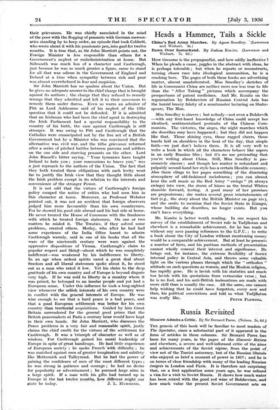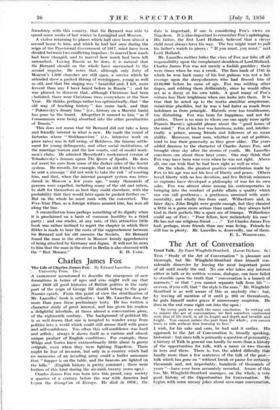Russia Revisited
Moscow Admits a Critic. By Sir Bernard Pares. (Nelson. 2s. 643.) Tax genesis of this book will be familiar to most readers of The Spectator, since a substantial part of it appeared in the form of articles in these columns. Sir Bernard Pares has been for many years, in the pages of the Slavonic Review and elsewhere, a severe and well-informed critic of the aims and achievements of the' Soviet regime, from the point of _ view not of the Tsarist autocracy, but of the Russian liberals who enjoyed so brief a moment of power in 1917; and he is on terms of close friendship with many of the leading Russian emigres in London and Paris. It is therefore not surprising that, on a first application some years ago, he was refused a visa for a visit to Soviet Russia. It shows how much water has been mixed With. the good red wine of Bolshevism, and how much value the present Soviet Government sets on
friendship with this country, that Sir Bernard was able to spend some weeks of last winter in Leningrad, and Moscow.
A visitor returning to places which- hail- once been almost a second home to him, and which he had kiit seen during the reign of the Provisional Government of 1917, Must have been divided between two conflicting impulses : to marvel, ow much had been changed, and to marvel how much had' been left untouched. ' Loving RussiS" as he ' does, it is natural that Sir Bernard should on the whole have succumbed to the second impulse. He notes that, although only forty of Moscow-'a- 1,600 churches are still open, a service which he attended drew a packed throng of worshippers, yonag as well as old, and that the singing was " beautiful' and, I felt, more fervent than any I have heard before in Russia " ; and he was pleased to discover that, although Christmas had been bolished, there were Christmas trees everywhere at the New Year. He thinks, perhaps rather too optimistically, that " the old way of teaching history " has come back, and that " Pokrovsky's dreary bias " (i.e., history on a Marxist basis) has gone by the board. Altogether it seemed to him " as if Communism were being absorbed into the other peculiarities of Russia."
This does not mean that Sir Bernard did not take a keen and friendly interest in what is new. He made the round of factories where " Stakhanovism " (i.e., intensive work on piece rates) was in full swing, of Bolshevo, the famous settle- ment for young delinquents, and other social institutions, of the marriage bureau and the law courts, and of model work- men's clubs. He admired Meyerhold's modernised version of Tchaikovsky's famous opera The Queen of Spades. He does not avert his eyes from some of the darker sides of the Soviet system. He records, for example, that an old friend to whom he sent a message " did not wish to take the risk " of meeting him, and that, when the internal passport system was intro- duced in Moscow a few years ago, " many thousands of persons were expelled, including many of the old and infirm, to shift for themselves as best they could elsewhere, with the probability that they would later again be pushed further on." But on the whole he must rank with the converted. The Five-Year Plan, as a foreign witness assured him, has won all along the line.
A reconciliation loses perhaps something of its dignity when it is proclaimed on a basis of common hostility to a third party ; and one reader, at any rate, of this attractive little book was rather inclined to regret the chapter in which Herr Hitler is made to bear the costs orthe 'rapprochement between Sir Bernard and his old enemies the Soviets. Sir Bernard found the man in the street in Moscow keenly apprehensive of being attacked by Germany and Japan. It will not be news to him that the man in the street in Berlin is also obsessed with















































 Previous page
Previous page